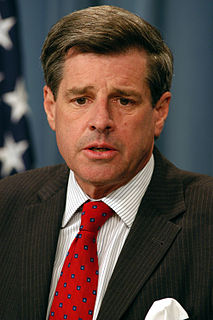 W
WThe Coalition Provisional Authority was a transitional government of Iraq established following the invasion of the country on 19 March 2003 by the U.S.-led Multinational Force and the fall of Ba'athist Iraq.
 W
WPhilip Bloom is an American businessman who pleaded guilty on April 18, 2006 to conspiracy, bribery and money laundering in connection with a scheme to defraud the Coalition Provisional Authority – South Central Region (CPA-SC) during the occupation of Iraq. According to the Sydney Morning Herald Bloom used CPA funds to pay out over $2 million USD in bribes, in cash, real estate, designer cars, watches, and the services of prostitutes he brought to Bagdad. Bloom accepted at least $1 million in bribes and stole a further $600,000 in cash and goods from CPA funds.
 W
WLewis Paul Bremer III is an American diplomat. He led the Coalition Provisional Authority (CPA) following the 2003 invasion of Iraq by the United States, from May 2003 until June 2004.
 W
WCraig Steven Davis is an international development and anti-corruption worker, specializing in the Muslim world, and author of multiple publications, including The Middle East for Dummies. He has worked in the developing world, primarily the Middle East and South Asia, as a government employee and USAID contractor. In 2009, he was the subject of accusations in Pakistan and left the country out of concerns for his own safety.
 W
WDe-Ba'athification refers to a policy undertaken in Iraq by the Coalition Provisional Authority (CPA) and subsequent Iraqi governments to remove the Ba'ath Party's influence in the new Iraqi political system after the 2003 invasion. It was considered by the Coalition Provisional Authority to be Iraq's equivalent to Germany's denazification after World War II. It was first outlined in CPA Order 1 which entered into force on 16 May 2003. The order declared that all public sector employees affiliated with the Ba'ath Party were to be removed from their positions and to be banned from any future employment in the public sector. The policy was highly controversial among American academics, institutions, government, military, and international media and debate outlets. The policy under the Coalition Provisional Authority was officially rescinded on 28 June 2004 as part of the transfer of sovereignty to the Iraqi Interim Government on 30 June 2004. However, elements of the policy continued under the Iraqi Governing Council and later under the elected Iraqi Parliament. Proponents of the policy contend that the policy effectively cleansed Iraqi society of Ba'athist influence, facilitating the creation of a democratic Iraqi government. Critics argue that the policy was not only undemocratic, but also a significant factor in the deteriorating security situation throughout Iraq.
 W
WJay Montgomery Garner is a retired United States Army lieutenant general who in 2003 was appointed as Director of the Office for Reconstruction and Humanitarian Assistance for Iraq following the 2003 invasion of Iraq but was soon replaced by Ambassador Paul Bremer and the ambassador's successor organization to ORHA, the Coalition Provisional Authority (CPA).
 W
WHume Alexander Horan was an American diplomat and ambassador to five countries, who has been described as "perhaps the most accomplished Arabic linguist to serve in the U.S. Foreign Service."
 W
WImperial Life in the Emerald City: Inside Iraq's Green Zone is a 2006 book by Rajiv Chandrasekaran.
 W
WThe Iraqi Governing Council (IGC) was the provisional government of Iraq from July 13, 2003 to June 1, 2004. It was established by and served under the United States-led Coalition Provisional Authority (CPA). The IGC consisted of various Iraqi political and tribal leaders who were appointed by the CPA to provide advice and leadership of the country until the June 2004 transfer of sovereignty to the Iraqi Interim Government.
 W
WReuben Jeffery III is the former United States Under Secretary of State for Economic, Business, and Agricultural Affairs, having been appointed to that position by United States President George W. Bush in June 2007. Presently, Reuben Jeffery III is the President, Chief Executive Officer and member of the board of Rockefeller & Co. and Rockefeller Financial Services, Inc. He is a member of the International Advisory Committee of J. Rothschild Capital Management Limited.
 W
WMy Year in Iraq: The Struggle to Build a Future of Hope is a memoir by ambassador Paul Bremer, Administrator of the Coalition Provisional Authority. Published in the United States on 9 January 2006 it covers the period between May 2003 to July 2004. Bremer takes the readers through his struggle with Iraq's leaders to build democratic institutions. He also describes negotiations with Iraqi leaders to write an interim constitution with guarantees for women and minority rights. Bremer explain his work with Iraq's politicians to build a responsible and representative government while facing an atmosphere of division and distrust among Iraq's politicians. The Shia Arabs, the country's long-repressed majority, deeply distrusted the Sunni Arab minority who had held power for centuries. Iraq's non-Arab Kurds teetered on the brink of secession when Bremer arrived. He had to find Sunnis willing to participate in the new political order.
 W
WKristen Silverberg was the United States Ambassador to the European Union from July 2008 until January 2009. She was nominated by President George W. Bush on April 24, 2008 and confirmed by the United States Senate on June 27, 2008. On July 22, 2008, she presented her credentials. She was succeeded by William Kennard who was nominated by President Barack Obama on August 6, 2009 and confirmed by the United States Senate on November 20, 2009.
 W
WThe Office of the Special Inspector General for Iraq Reconstruction (SIGIR) was created as the successor to the Coalition Provisional Authority Office of Inspector General (CPA-IG). SIGIR was an independent government agency created by the Congress to provide oversight of the use of the $52 billion U.S. reconstruction program in Iraq. Stuart W. Bowen Jr. was appointed to the position of CPA-IG on January 20, 2004 and served until its closure in October 2013. SIGIR reported directly to Congress, the Secretary of State, and the Secretary of Defense.